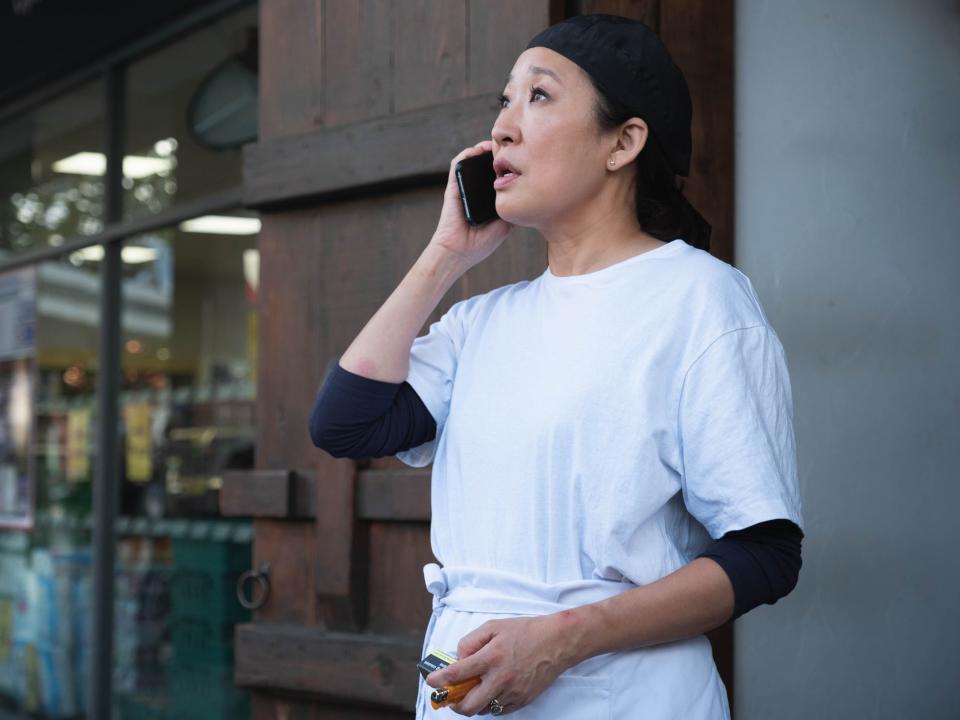Killing Eve season three review: This once-thrilling comedy drama has grown stale and predictable

Coronavirus chaos might have delayed almost everything else in production, but it has brought forward the third series of Killing Eve. The programme was originally scheduled for the summer. Instead, we get it in early April. The BBC would say that this is a gift to viewers thirsty for Jodie Comer-based distraction. Killing Eve, killing evenings. A cynic might wonder if it knows its flagship thriller is a bit iffy these days, and wants to get it out while the entire western world is under house arrest, glued to their TV.
Either way, here it is. Season two finished on a “cliffhanger”, but only in the sense that you wondered whether it would be a year until the next series came out, or six months. Glamourpuss assassin Villanelle (Jodie Comer) shot British spy/rogue agent Eve (Sandra Oh) in Rome. There was no way she was dead. When the BBC has a hit in America and Britain, as Killing Eve is, it doesn’t give it up without a bloody scrap (literally, in the case of Jeremy Clarkson’s Top Gear). It will keep this going as long as possible, which can’t be forever. Comer, in particular, is due a role that will let her display depth as well as range.
The series was created by Fleabag mastermind Phoebe Waller-Bridge, who adapted Luke Jennings’s novellas. She wrote the early episodes herself and her fingerprints were obvious. The script had wit and soul and style, and was so much more fun than the average spy thriller that Daniel Craig recruited her to spruce up the new Bond script. Comer and Oh circled each other warily across glamorous European cities, as Comer bumped off a succession of targets in imaginatively gruesome ways. You were never quite sure whether they would fight or get off with each other, less cat and mouse than cat and cat, and their energy propelled the whole series. Some of the supporting performances were entertaining, like Fiona Shaw as spook boss Carolyn, and Kim Bodnia as Villanelle’s handler, Konstantin, but they were little more than cutouts.
Emerald Fennell took over writing duties for the second series, and the same elements somehow added up to less. Partly, this was second album syndrome, but you can’t discount the Waller-Bridge effect. At its best, Killing Eve was a high-wire act, which banked on providing enough amusement that its ridiculous plots and cartoonish characterisation didn’t matter.
Fennell handed over to yet another writer, Suzanne Heathcote, who previously worked on Fear the Walking Dead. Her zombie experience might come in handy. Where Killing Eve had a vitality, it now feels tired to the point of lifelessness. Eve Polastri is not dead but living only half a life. No longer an agent tracking down horrible murders with incompetent male colleagues, she is working as a chef at Han in New Malden, listening to the romantic travails of her junior male colleagues while she hacks up meat. You can’t imagine Waller-Bridge letting herself get away with that kind of metaphor. Eve is estranged from her husband Niko (Owen McDonnell), who is rehabilitating.
Her old co-worker Kenny (Sean Delaney), Carolyn’s son, has a new job, too, as a journalist. In one of Killing Eve’s many departures from plausibility, he is underworked in his new role, and has enough time on his hands to check on his former boss at her flat, with mixed results. Villanelle is suffering from a similar ennui. She has contrived to marry a wealthy Spanish woman. It’s unclear why, other than to provide an opportunity for a punch-up with former boss Harriet Walter. Before long, she is sucked back into her old ways, and onto Eve’s radar.
But who cares? Once fresh and thrilling, Killing Eve has grown stale and predictable. It’s 2020, and phones still click and whoop when texts are sent. The humour is weary. I groaned when Carolyn told Kenny he was working for a website and he corrected her by saying he was working for an “online publication”. Comer remains watchable, but she could film herself opening her post and it would be better than a lot of what’s on TV.
Killing Eve has already been renewed for a fourth season, so criticism is probably pissing in the wind, but the truth is that beyond Comer, it doesn’t have much left to offer. Sometimes killing can be a mercy.

 Yahoo News
Yahoo News 